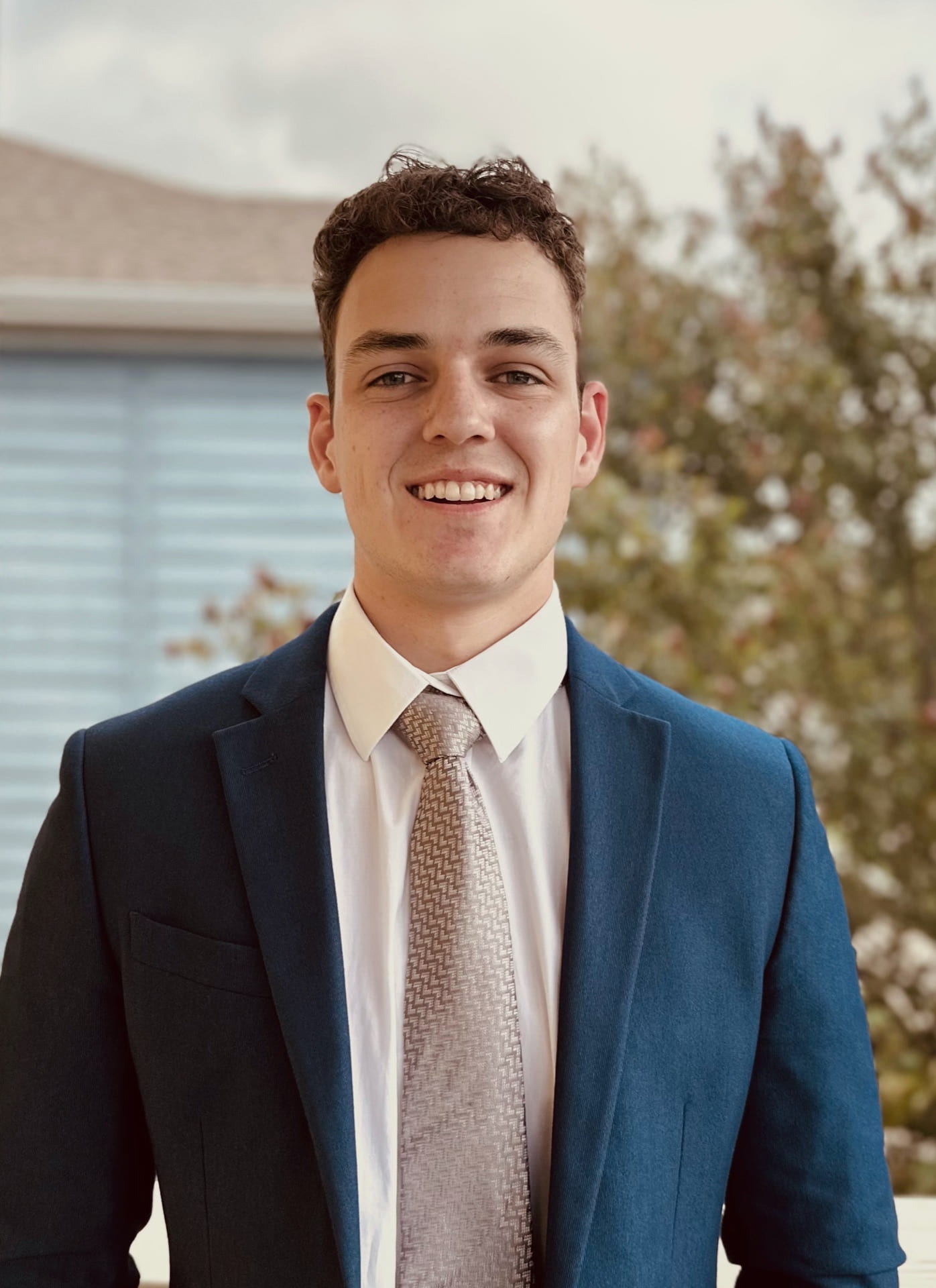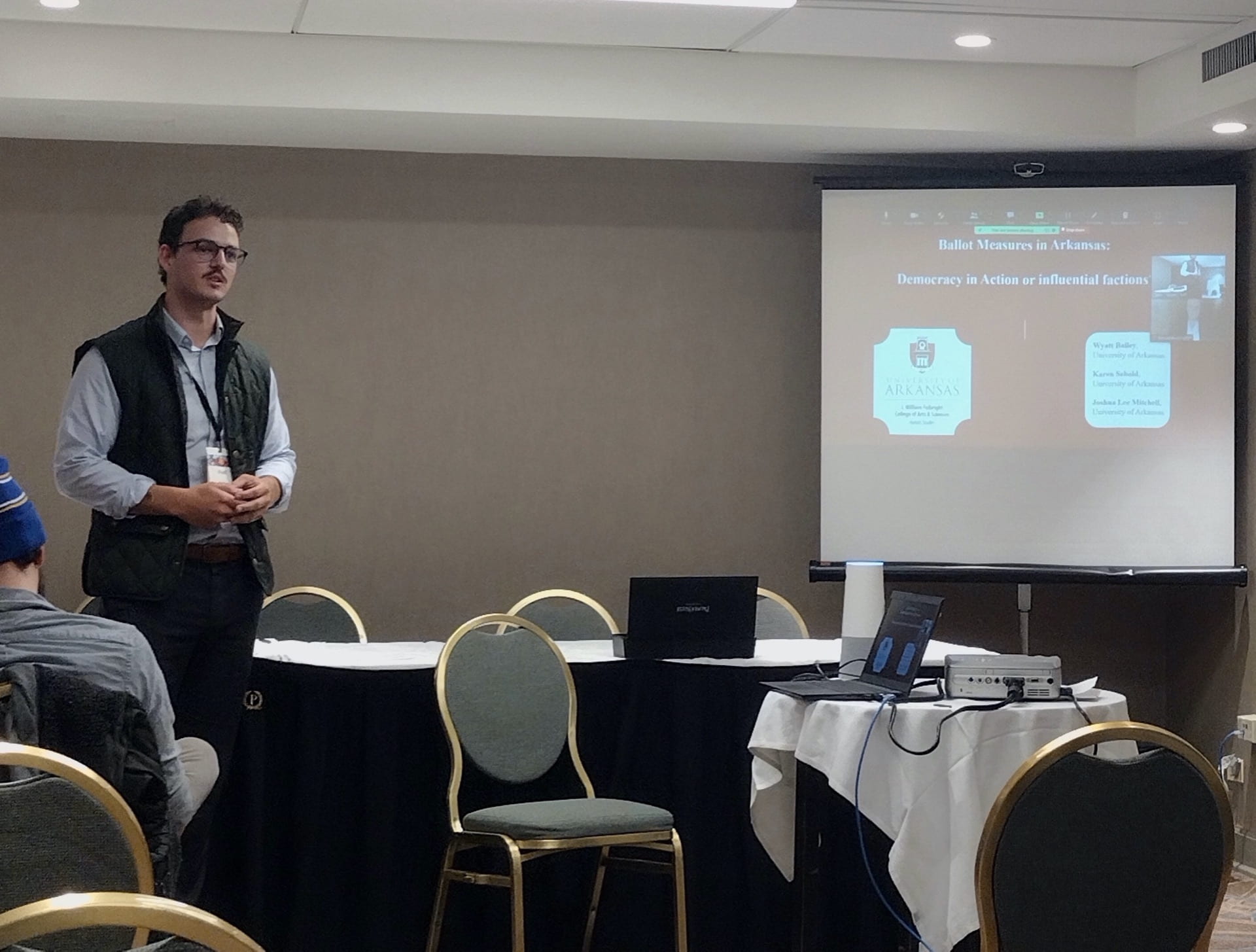Wyatt Bailey is an honors student from Lubbock, Texas, studying political science with minors in legal studies and philosophy. This month, he presented a study he completed examining the impact of financial influences on the Arkansas ballot measure system at the Midwest Political Science Association.
 My research found that spending against a given ballot measure by special interest groups, such as political action committees, corporations, unions and religious groups increases the probability of the measure’s failure. As a majority of previous research has explored influences on specific ballot issues or influences in states with more significant resources and populations, these findings create an exciting outlook for ballot measures. This study allows the people of Arkansas to understand that their decision to oppose a given ballot measure will have a significant effect on the measure’s outcome, allowing them to participate actively in direct democracy.
My research found that spending against a given ballot measure by special interest groups, such as political action committees, corporations, unions and religious groups increases the probability of the measure’s failure. As a majority of previous research has explored influences on specific ballot issues or influences in states with more significant resources and populations, these findings create an exciting outlook for ballot measures. This study allows the people of Arkansas to understand that their decision to oppose a given ballot measure will have a significant effect on the measure’s outcome, allowing them to participate actively in direct democracy.
In mid-October of 2023, my thesis director, professor Karen Sebold, advised me to look into submitting my research to present at a conference. I then worked on creating a proposal for my research and completing all of the requirements to submit for a poster presentation, as most undergraduates do. Before submission, professor Sebold mentioned that I should apply not as a poster presentation but alternatively to submit my research as a part of a panel, which I had not considered. About a month after I applied, I got a reply. My study had been accepted by the Midwest Political Science Association to be presented on a panel at their annual conference in Chicago.
 This opportunity allowed me to join a panel with similar researchers in early April 2024. The panel was titled On Losingand was structured around research exploring the influences of losing in regard to campaigns and elections. Each panelist went up individually to present their research. The presentations varied in content as some presented their preliminary research designs or their base-level findings while others presented their completed findings and finished works. I presented my research as the last presentation on the panel for about fifteen minutes, elaborating on my completed findings. Then, we discussed our respective studies as a panel and audience.
This opportunity allowed me to join a panel with similar researchers in early April 2024. The panel was titled On Losingand was structured around research exploring the influences of losing in regard to campaigns and elections. Each panelist went up individually to present their research. The presentations varied in content as some presented their preliminary research designs or their base-level findings while others presented their completed findings and finished works. I presented my research as the last presentation on the panel for about fifteen minutes, elaborating on my completed findings. Then, we discussed our respective studies as a panel and audience.
Many of these studies, being incomplete, designed their presentations to request criticism and suggestions; this resulted in most of the panels’ time being spent discussing our work. The group was encouraging and supportive of my research and offered great suggestions. I was given ideas on expanding my research and examples of future routes I could utilize to explore my findings further. Toward the end of the discussion, one of the panelists, a professor at McAllister University, directed me to one of her undergraduate students who was there to present his research on ballot measures the following day. I spent the evening exploring Chicago and getting some pizza before returning to the hotel to add recommendations from earlier in the day to my research.
The following day, I made my way to the conference and up the labyrinth of the Palmer House Chicago Hotel to the exhibition room, where I met with an undergraduate student from McAllister University. For the next half an hour or so, he, another student, and I spoke about the current ballot measure systems in the United States and our findings within this area. This was a great opportunity to grow my knowledge on the issue and network with like-minded people about issues we are all passionate about. I spent the rest of the conference exploring and speaking with a variety of other researchers on their specific areas. I was also able to take time and add more to my research as a result of these conversations and suggestions. This was incredibly useful because I plan to extend this research beyond the requirements of my honors thesis and work with professor Sebold to submit the paper for publishing.
This experience was pivotal during my time as an undergraduate. It expanded my understanding of the current state of political science, refined my presentation skills (which also helped my preparation for the thesis defense), expanded my connections within the field and provided valuable insights that aided in the growth of my research and considerations for future studies. I am incredibly grateful for this opportunity and for professor Sebold’s encouragement in pushing me to exceed my limits and pursue opportunities I would not have otherwise considered. Having this experience under my belt will not only enhance my academic skills as I begin law school at the University of Arkansas this fall but also contribute to my personal growth and professional development.
